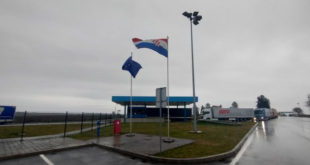Serge Brammertz, chief prosecutor at the International Criminal Tribunal for the former Yugoslavia, will join prosecutors from the region for a two-day conference in Brioni, Croatia on cooperation in war crimes prosecution.
Olga Kavran, spokesperson for the office of the prosecution at the UN war crimes court, said that regional cooperation in this area is considered to be one of the key priorities for the region. She noted that the conference in Brioni “will be an opportunity to assess the cooperation, highlight its successes and identify areas in which further improvement may be necessary”.
The conference is scheduled for Thursday and Friday.
“This is a very important meeting of state prosecutors from the region and the Hague, and I am happy to be here since there are so many open questions we have to deal with having in mind that ICTY mandate will end three years from now” Brammertz told Croatian TV Nova, adding that it is important to strengthen cooperation between Croatia, Serbia, Montenegto and Bosnia, as well as their cooperation with the ICTY.
In addition to regional prosecutors and Brammertz, Croatian President Ivo Josipovic and Croatian Minister of Justice Ivan Simonovic will participate in the conference, along with the head of the EU delegation in Zagreb, Paul Vandoren, and Stephen Rapp, US ambassador-at-large for war crimes issues.
Dutch Ambassador to Croatia Catharina Maria Trooster and the general secretary of the International Association of Prosecutors, Marquart Scholtz, are also expected to attend.
Strong regional cooperation, including in war crimes prosecution, is one of the key elements for the region’s EU integration process.
Cooperation between Serbia and Croatia’s war crimes prosecutors was evident recently when Croatia arrested Zeljko Gojak, suspected for war crimes committed against Serb civilians in 1991. Last week the Serbian prosecution delivered to the Croatian state prosecution information about Gojak, and asked for his prosecution on war crimes charges.
According to the Serbian prosecution, the Gojak case is the 11th case for which it has delivered information to Croatia as part of the countries’ cooperation in this area.
One of the most significant problems facing the countries in the region relates to dual citizens who cross borders and escape prosecution. Bosnia, Serbia, and Croatia made attempts recently to address this issue.
In early February, Sarajevo and Zagreb signed an agreement that allows for the arrest and extradition of persons who were sentenced by a second instance verdict and fled to the neighbouring country.
The agreement allows the convict to choose, if he posesses dual citizenship, where he wishes to serve his sentence, either in the country where he was convicted or in the country to which he fled.
Bosnia and Serbia signed a similar agreement in late February.
Prior to these accords, convicted criminals had to give their consent to serve their sentence in the country to which they fled, and the countries’ laws prevented the extradition of their own citizens. For example, laws prevented Bosnia from extraditing a criminal convicted in Serbia if he held Bosnian citizenship, and vice versa for Serbia.
Radio Free Europe reports that 282 persons escaped from Bosnia after they were convicted by a second instance verdict. 100 of them are reportedly in Serbia, 110 in Croatia, 13 in Montenegro and for 56 there are no records available.
This week’s gathering is the fourth regional conference of prosecutors held on the island of Brioni.
 Eurasia Press & News
Eurasia Press & News


